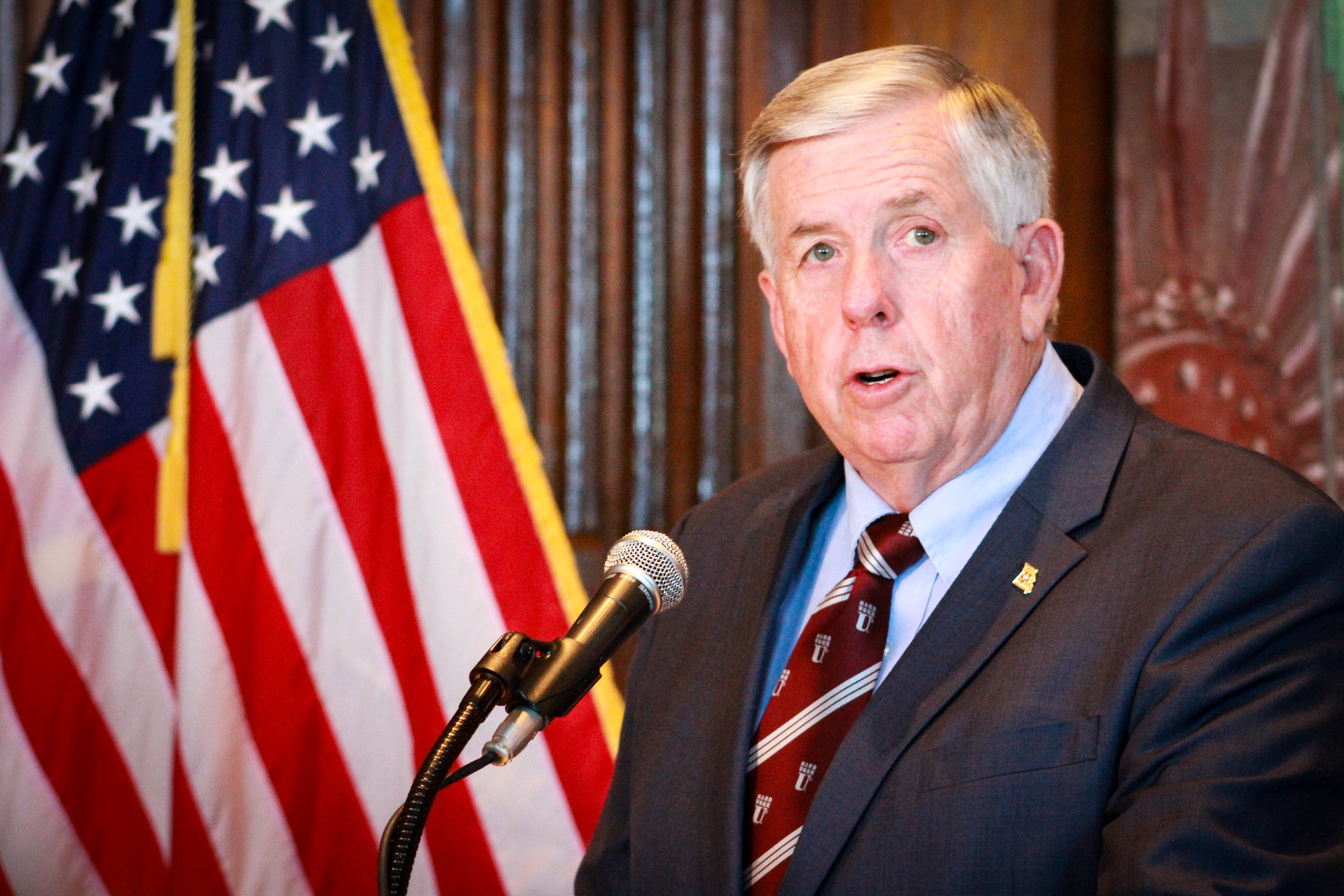JEFFERSON CITY, Mo. — Missouri’s chief executive wants to continue full funding of the education formula while boosting funding for the state’s transportation infrastructure and giving state workers a pay boost.
In a proposed $30 billion state budget, released in tandem with his first State of the State address, Gov. Mike Parson laid out his fiscal priorities — a move not seen under the preceding governor.
The key funding areas fall in line with the two issues Parson has been focusing on in his six months as governor: workforce development and infrastructure. The budget recommendation also includes funds to address public safety, state employee pay, and increasing government efficiency.
The spending blueprint for the upcoming year balances the books without asking for new taxes or any new funding sources, such as online sales tax or sports gambling.
The Consensus Revenue Estimate is projecting that general revenue collection for Fiscal Year 2020 will go up compared to the current year. Net general revenue collections in FY2020 are estimated to be $9.822 billion. This represents growth of $193 million over the estimated revenue for FY2019. The estimate for FY2020 assumes growth of 2.0 percent. The revised estimate for the current Fiscal Year is $9.629 billion.
Between general revenue collections, federal funds, and other sources of revenue the total budget for FY2020 — which starts July 1, 2019 — is $30,090,180,470. That figure includes one-time expense Capitol improvements.
The operating budget for FY2020 is $29.7 billion. The approved operating budget for FY2019 is $28.8 billion. Operating expenditures in FY2018 totaled $25.7 billion.
Of the proposed operating budget, $10.1 million comes from general revenue, $9.9 million from federal funds, and $9.7 million from other funds. Comparatively, in FY2019, $9.6 million came from general revenue, $9.7 million from federal funds, and $9.4 million from other funds.
Part of the budget recommendation the Parson is making is to address an issue that keeps getting kicked down the road: transportation infrastructure.
Last session, lawmakers sent a referendum to the voters, asking for an increase in Missouri’s motor fuel tax to fund repairs to roads and bridges. The voters reject the proposal at the ballot box leaving the state’s leaders to come up with other solutions to the program.
The fix that Missouri’s governor — who advocated for the fuel tax increase — is presenting is to borrow more than a quarter of a billion dollars.
Parson is proposing a $351 million bond package that the state would pay off over 15 years. The funds would go the fix 250 bridges in Missouri that are in need of critical repair or replacement. Budget Director Dan Hough noted that once fixed, the bridges could last between 50 to 100 years. Parson noted that the borrowed cash could create thousands of jobs.
But bridges aren’t the only issue needing additional funds to repair in Missouri. Parson is asking for $50 million to be allocated for a transportation cost-share program with local communities.
When it comes to funding school transportation, Parson is recommending that an additional $10 million be earmarked. The FY 2019 budget, as approved of by the General Assembly, allotted $10 million for school transportation.
This funding increase for elementary and secondary education transportation comes in combination with a fully funded education formula. For the two previous years, the state has consecutively fully funded the formula — an effort championed by the now-State Treasurer Scott Fitzpatrick, who was the House budget chair at the time.
Missouri’s public schools would see core funding rise by roughly $60 million for the upcoming year. Parson in proposing increase the funding from $3.49 billion in FY2019 to $3.55 billion in FY2020.
Parson is also using the budget to further workforce development, a priority he has been championing long before he becomes the state’s chief executive.
He is asking that $22 million go to the Fast-Track Workforce Grant Program. The program would award grants to Missourians over the age of 25 with a household adjusted income of less than $80,000 who are working towards a degree in programs that fill a high-needs skills gap.
Under Parson’s recommendation, $16.7 million would go for Missouri Higher Education Institutions to develop and expand employer-driven education, training programs, and initiatives. Missouri One Start — consolidation of the Missouri Works program — would see a $10 million increase.
In a move out of the ordinary, Parson is proposing to set aside $116.7 million for future budget emergencies.
The only department Parson is proposing a decrease in funding is Economic Development. The proposed budget for the Department of Economic Development in FY2020 is $238 million, down from $363 million in FY2019.
All other departments are set to see a funding increase under Parson’s budget proposal.
Through all this, Parson wants to give state workers a pay raise.
Beginning January 1, 2020, all state workers would see a 3 percent cost of living salary adjustment. On top of that, Parson is proposing an additional increase for employees at the Department of Corrections.
Parson’s budget allocates $30 million for cost of living increase, $8.2 million for corrections employees, and $5.3 million is earmarked for salary adjustments to meet market minimums.
Part of the cost savings in the budget proposal is consolidating the Crossroads Correction Center and the nearby Western Missouri Correction Center. Staff and prisoners are expected to be transferred. Decreasing Crossroads to “caretaker status” is projected to save $20 million.
Parson’s proposal would also reduce the number of full-time state employees by 436 positions. The administration stressed that the cuts would be through retirements and vacancies rather than layoffs.

Alisha Shurr was a reporter for The Missouri Times and The Missouri Times Magazine. She joined The Missouri Times in January 2018 after working as a copy editor for her hometown newspaper in Southern Oregon. Alisha is a graduate of Kansas State University.
















